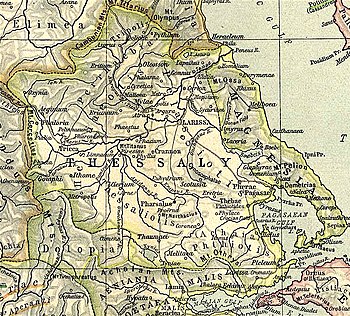39°47′53″N 22°34′11″E / 39.798151°N 22.569853°E

Gyrton (Ancient Greek: Γυρτών) or Gyrtona or Gyrtone (Γυρτώνη)[1] was a town and polis (city-state)[2] of Perrhaebia in ancient Thessaly, situated in a fertile plain between the rivers Titaresius and Peneius. Strabo connects Gyrton with the mouth of the Peneius;[3] but it is evident from the description of Livy, whose account has been derived from Polybius, that it stood in some part of those plains in which Phalanna, Atrax, and Larissa were situated.[4] It was only one day's march from Phalanna to Gyrton.[5] It was an ancient town even in Classical times, mentioned by Homer,[1] and continued to be a place of importance till later times, when it is called opulent by Apollonius Rhodius.[6] It was said to have been the original abode of the Phlegyae, and to have been founded by Gyrton, the brother of Phlegyas.[7][8] Others say that it derived its name from Gyrtone, who is called a daughter of Phlegyas.[9]
The Gyrtonians are mentioned among the Thessalians who sent aid to the Athenians at the commencement of the Peloponnesian War.[10] The name of the city frequently occurs at a later period, by Livy, Polybius,[11] Pomponius Mela/[12] Pliny the Elder,[13] and Ptolemy.[14]
Gyrton also minted coins.[15]
The location of Gyrton is a site called Mourlari, southeast of the modern town of Evangelismos.[16][17]
- ^ a b Homer. Iliad. Vol. 2.738.
- ^ Mogens Herman Hansen & Thomas Heine Nielsen (2004). "Thessaly and Adjacent Regions". An inventory of archaic and classical poleis. New York: Oxford University Press. p. 6932. ISBN 0-19-814099-1.
- ^ Strabo. Geographica. Vol. ix. pp. 439, 441. Page numbers refer to those of Isaac Casaubon's edition.
- ^ Livy. Ab urbe condita Libri [History of Rome]. Vol. 36.10, 42.54.
- ^ Livy. Ab urbe condita Libri [History of Rome]. Vol. 42.54.
- ^ Apollonius of Rhodes. Argonautica. Vol. 1.57.
- ^ Strabo. Geographica. Vol. ix. p.442. Page numbers refer to those of Isaac Casaubon's edition.
- ^ Stephanus of Byzantium. Ethnica. Vol. sub voce Γυρτών.
- ^ A Dictionary of Greek and Roman biography and mythology, Gyrton
- ^ Thucydides. History of the Peloponnesian War. Vol. 2.22.
- ^ Polybius. The Histories. Vol. 18.5.
- ^ Pomponius Mela. De situ orbis. Vol. 2.3.
- ^ Pliny. Naturalis Historia. Vol. 4.9.16.
- ^ Ptolemy. The Geography. Vol. 3.13.43.
- ^
 Smith, William, ed. (1854–1857). "Gyrton". Dictionary of Greek and Roman Geography. London: John Murray.
Smith, William, ed. (1854–1857). "Gyrton". Dictionary of Greek and Roman Geography. London: John Murray.
- ^ Richard Talbert, ed. (2000). Barrington Atlas of the Greek and Roman World. Princeton University Press. p. 55, and directory notes accompanying. ISBN 978-0-691-03169-9.
- ^ Lund University. Digital Atlas of the Roman Empire.